
The Doors is the debut studio album by American rock band the Doors, released on January 4, 1967, by Elektra Records. It was recorded in August 1966 at Sunset Sound Recorders, in Hollywood, California, under the production of Paul A. Rothchild. The album features the extended version of the band's breakthrough single "Light My Fire" and the lengthy closer "The End" with its Oedipal spoken word section. Various publications, including BBC and Rolling Stone, have ranked The Doors as one of the greatest debut albums of all time.

Chester Arthur Burnett, better known by his stage name Howlin' Wolf, was an American blues singer and guitarist. He was at the forefront of transforming acoustic Delta blues into electric Chicago blues, and over a four-decade career, recorded blues, rhythm and blues, rock and roll, and psychedelic rock. He is regarded as one of the most influential blues musicians of all time.

"Love Me Two Times" is a song by the American rock band the Doors. First appearing on their second studio album Strange Days, it was later edited to a 2:37 length and released as the second single from that album. The single reached number 25 on the charts in the United States.
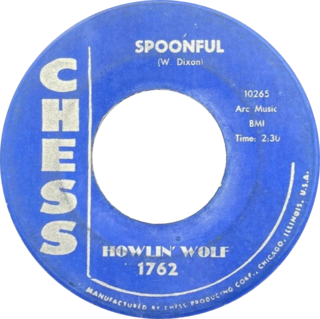
"Spoonful" is a blues song written by Willie Dixon and first recorded in 1960 by Howlin' Wolf. Called "a stark and haunting work", it is one of Dixon's best known and most interpreted songs. Etta James and Harvey Fuqua had a pop and R&B record chart hit with their duet cover of "Spoonful" in 1961, and it was popularized in the late 1960s by the British rock group Cream.

"Killing Floor" is a 1964 song by American blues singer-songwriter and guitarist Howlin' Wolf. Called "one of the defining classics of Chicago electric blues", "Killing Floor" became a blues standard with recordings by various artists. It has been acknowledged by the Blues Foundation Hall of Fame, which noted its popularity among rock as well as blues musicians. English rock group Led Zeppelin adapted the song for their "The Lemon Song", for which Howlin' Wolf is named as a co-author.

"Smokestack Lightning" is a blues song recorded by Howlin' Wolf in 1956. It became one of his most popular and influential songs. It is based on earlier blues songs, and numerous artists later interpreted it.
"When the Music's Over" is an epic song by the American rock band the Doors, which appears on their second album Strange Days, released in 1967. It is among the band's longer pieces, lasting 11 minutes.
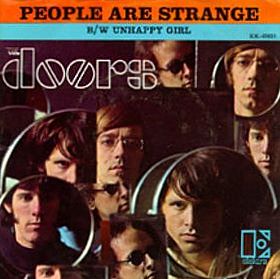
"People Are Strange" is a song by the American rock band the Doors. It appears on the band's second studio album, Strange Days, released in September 1967. The song was written by the Doors' vocalist Jim Morrison and guitarist Robby Krieger, although all of the band are credited on the sleeve notes.
"Wang Dang Doodle" is a blues song written by Willie Dixon. Music critic Mike Rowe calls it a party song in an urban style with its massive, rolling, exciting beat. It was first recorded by Howlin' Wolf in 1960 and released by Chess Records in 1961. In 1965, Dixon and Leonard Chess persuaded Koko Taylor to record it for Checker Records, a Chess subsidiary. Taylor's rendition quickly became a hit, reaching number thirteen on the Billboard R&B chart and number 58 on the pop chart. "Wang Dang Doodle" became a blues standard and has been recorded by various artists. Taylor's version was added to the United States National Recording Registry in 2023.

"Little Red Rooster" is a blues standard credited to arranger and songwriter Willie Dixon. The song was first recorded in 1961 by American blues musician Howlin' Wolf in the Chicago blues style. His vocal and slide guitar playing are key elements of the song. It is rooted in the Delta blues tradition and the theme is derived from folklore. Musical antecedents to "Little Red Rooster" appear in earlier songs by blues artists Charlie Patton and Memphis Minnie.

I Am the Blues is the sixth studio Chicago blues album released in 1970 by the well-known bluesman Willie Dixon. It is also the title of Dixon's autobiography, edited by Don Snowden.
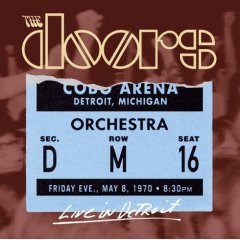
Live in Detroit is a double CD live album by the American rock band the Doors. It was recorded at the Cobo Arena in Detroit on May 8, 1970 during the band's 1970 Roadhouse Blues Tour. It was released on October 23, 2000 on Rhino Records.
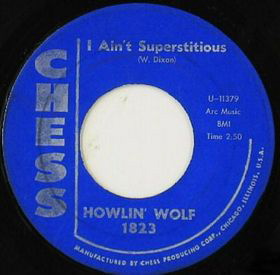
"I Ain't Superstitious" is a song written by bluesman Willie Dixon and first recorded by Howlin' Wolf in 1961. It recounts various superstitions, including that of a black cat crossing the pathway. The song has been recorded by a number of artists, including Jeff Beck, whose blues rock adaptation in 1968 was named one of Rolling Stone magazine's "100 Greatest Guitar Songs of All Time".

"Evil", sometimes listed as "Evil (Is Going On)", is a Chicago blues song written by Willie Dixon. Howlin' Wolf recorded the song in Chicago for Chess Records in 1954. It was included on the 1959 compilation album Moanin' in the Moonlight. When he re-recorded it for The Howlin' Wolf Album in 1969, "Evil" became Wolf's last charting single, reaching number 43 Billboard R&B chart.
"Soul Kitchen" is a song by the Doors from their self-titled debut album The Doors. Singer Jim Morrison wrote the lyrics as a tribute to the soul food restaurant Olivia's in Venice Beach, California. Because he often stayed too late, the staff had to kick him out, thus the lines "let me sleep all night, in your soul kitchen".

"Forty-Four" or "44 Blues" is a blues standard whose origins have been traced back to early 1920s Louisiana. However, it was Roosevelt Sykes, who provided the lyrics and first recorded it in 1929, that helped popularize the song. "Forty-Four," through numerous adaptations and recordings, remains in the blues lexicon eighty years later.
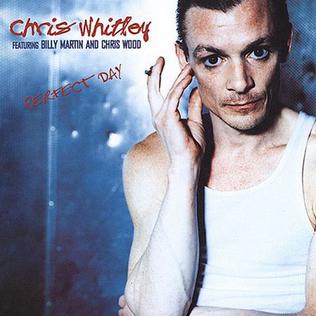
Perfect Day is the sixth album by singer-songwriter and guitarist, Chris Whitley. It is his fifth studio album.

Manzarek–Krieger was an American rock band formed by two former members of the Doors, Ray Manzarek and Robby Krieger, in 2002. They were also known as "The Doors of the 21st Century", "D21C", and "Riders on the Storm" after the Doors song of the same name. They settled on using "Manzarek–Krieger" or "Ray Manzarek and Robby Krieger of The Doors" for legal reasons, after acrimonious debates and court battles between the two musicians and Doors co-founder/ drummer John Densmore. They performed Doors material exclusively until the death of Manzarek in 2013.
"Been Down So Long" is a song by the American rock band the Doors. It appears as the third track on L.A. Woman, the last studio album that lead singer Jim Morrison recorded with the group. It has been called, notably by critic Robert Christgau, as a "take-off" on the album.

"You Make Me Real" is a song written by Jim Morrison that was first released on the Doors 1970 album Morrison Hotel. It was also released as the only single from the album, reaching No. 50 on the Billboard Hot 100, but was ultimately surpassed in popularity by its B-side, "Roadhouse Blues". In France the single was issued with "Peace Frog" as the B-side.
















